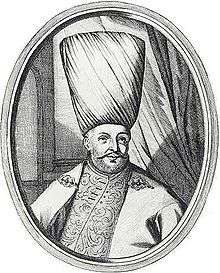Köprülüzade Fazıl Ahmed Pasha
Köprülüzade Fazıl Ahmed Pasha (Ottoman Turkish: كپرولى زاده فاضل احمد پاشا, Turkish: Köprülü Fazıl Ahmet Paşa; Albanian: Fazıl Ahmed Pashë Kypriljoti; 1635 – 3 November 1676) was an Ottoman nobleman and statesman, who was a member of the renowned Köprülü family originating from Albania, which produced six grand viziers of the Ottoman Empire.[1]

Köprülü Fazıl Ahmed | |
|---|---|
 An engraving | |
| Grand Vizier of the Ottoman Empire | |
| In office 31 October 1661 – 3 November 1676 | |
| Monarch | Mehmed IV |
| Preceded by | Köprülü Mehmed Pasha |
| Succeeded by | Kara Mustafa Pasha |
| Personal details | |
| Born | 1635 Veles (then named Köprülü, now in North Macedonia) |
| Died | 3 November 1676 (aged 40–41) Constantinople, Ottoman Empire |
| Nationality | Ottoman |
| Relations | Köprülüzade Fazıl Mustafa Pasha (brother) Köprülüzade Numan Pasha (nephew) Kara Mustafa Pasha (brother-in-law) Abaza Siyavuş Pasha (brother-in-law) Amcazade Köprülü Hüseyin Pasha (cousin) |
| Parents | Köprülü Mehmed Pasha (father) |
| Origins | Albanian |
| Family | Köprülü family |
| Military service | |
| Allegiance | |
| Battles/wars | Austro-Turkish War (1663–64)
Cretan War (1645–69) Polish–Ottoman War (1672–76) |
Life
He served as grand vizier from 1661 to 1676 after he inherited the title from his father, Köprülü Mehmed Pasha, the founder of the Köprülü political family. Prior to this appointment, he served as the Ottoman governor of the Damascus Eyalet (1660 to 1661) and the Erzurum Eyalet (1659 to 1660).[2]
He was dubbed Fazıl, meaning "wise" (from the Arabic fazilet, meaning "wisdom"), for reducing taxation and promoting education. On the other hand, he was brutal in war. He led the Ottoman army in the Austro-Turkish War (1663–64). At the beginning of July 1664, he succeeded in destroying Novi Zrin in the northern part of the Kingdom of Croatia after nearly a month-long siege. Although defeated in the Battle of Saint Gotthard, he was able to gain territory by the Peace of Vasvár in 1664.
Following this treaty, he concentrated on the Cretan War and captured Candia (present-day Heraklion) from the Republic of Venice in 1669. At the end of the Polish–Ottoman War (1672–1676) against the Polish–Lithuanian Commonwealth, he signed the Treaty of Buchach in 1672 and the Treaty of Żurawno in 1676.
Contemporary European observers frequently remarked upon the atheistic tendencies of Fazıl Ahmed's inner circle of courtiers, and particularly those of Fazıl Ahmed himself. Nevertheless, his exact religious views remain unknown.[3]
Fazıl Ahmed Pasha died on November 3, 1676 from complications resulting from his lifestyle of heavy drinking.[4]
See also
- Köprülü family
- Köprülü era of the Ottoman Empire
- List of Ottoman Grand Viziers
- List of Ottoman governors of Damascus
References
- Encyclopedia of the Ottoman Empire By Gábor Ágoston, Bruce Alan Masters,
- Mehmet Süreyya (1996) [1890], Nuri Akbayar; Seyit A. Kahraman (eds.), Sicill-i Osmanî (in Turkish), 1, Beşiktaş, Istanbul: Türkiye Kültür Bakanlığı and Türkiye Ekonomik ve Toplumsal Tarih Vakfı, p. 209
- Wurm, Heidrun (1971). Der osmanische Historiker Ḥüseyn b. Ğafer, genannt Hezārfenn, und die Istanbuler Gesellschaft in der zweiten Hälfte des 17. Jahrhunderts. Freiburg im Breisgau: Klaus Schwarz Verlag. p. 52. [in German]
- Finkel, Caroline (2005). Osman's Dream: The Story of the Ottoman Empire, 1300-1923. New York: Basic Books. pp. 278, 281. ISBN 978-0-465-02396-7.
External links
- . Encyclopædia Britannica (11th ed.). 1911.
| Political offices | ||
|---|---|---|
| Preceded by Köprülü Mehmed Pasha |
Grand Vizier of the Ottoman Empire 31 October 1661 – 3 November 1676 |
Succeeded by Kara Mustafa Pasha |